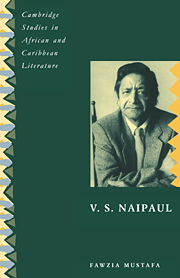3 - Home
Published online by Cambridge University Press: 06 January 2010
Summary
Elvira, you is a bitch.
(V.S. Naipaul, The Suffrage of Elvira)A HOUSE FOR MR. BISWAS (1961)
Despite the novel's opening statement of Mohun Biswas' death, the first few paragraphs record the narrative's only sustained moments of satisfaction. They are Biswas' appreciation of his wife's loyalty to himself and their children, and her independence from her mother and sisters, as well as his articulated wonderment at “being in his own house, the audacity of it” (A House for Mr. Biswas, p. 8). Indeed, the coda the Prologue offers is made up of an inventory of Biswas' possessions, and the proprietal victories he appears to have achieved with his family, and his “claim to one's portion of the earth” (A House for Mr. Biswas, p. 14). The third-person narrative with its omniscient narrative voice, however, also contextualizes Biswas' success by portraying the general paucity that underlies all his claims. The mortgage on the house, the solicitor's clerk's scam, the neglect of Biswas' mother, Shama's struggles, and Biswas' illness all announce the limitations to Biswas' sense of achievement. To begin the novel with a coda, futhermore, underscores the determinist tendency of the plot, which will indeed proceed to develop as though Biswas' life is already curtailed.
Biswas' birth is at once problematic, causing as it does prophecies of doom for his parents, Bipti and Raghu.
- Type
- Chapter
- Information
- V. S. Naipaul , pp. 59 - 87Publisher: Cambridge University PressPrint publication year: 1995



